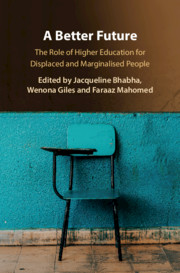Book contents
- A Better Future
- A Better Future
- Copyright page
- Contents
- Figures
- Tables
- Notes on Contributors
- Introduction
- Part I Encountering Marginalisation
- Part II Deconstructing Marginalisation
- Part III Confronting Marginalisation
- Chapter 14 ‘Now I Constantly Challenge Society by Bringing My Existence Forward’
- Chapter 15 Towards an Emergent Theory of Fallism (and the Fall of the White-Liberal-University in South Africa)
- Chapter 16 Family Sacrifice, Faltering Systems
- Chapter 17 DACAmented
- Chapter 18 Building Ethical Relationships through the Borderless Higher Education for Refugees Project in Dadaab, Kenya
- Chapter 19 The ‘Jungle’ Is Here; The Jungle Is Outside
- Chapter 20 Culture, Gender and Technology
- Index
- References
Chapter 18 - Building Ethical Relationships through the Borderless Higher Education for Refugees Project in Dadaab, Kenya
from Part III - Confronting Marginalisation
Published online by Cambridge University Press: 06 September 2020
- A Better Future
- A Better Future
- Copyright page
- Contents
- Figures
- Tables
- Notes on Contributors
- Introduction
- Part I Encountering Marginalisation
- Part II Deconstructing Marginalisation
- Part III Confronting Marginalisation
- Chapter 14 ‘Now I Constantly Challenge Society by Bringing My Existence Forward’
- Chapter 15 Towards an Emergent Theory of Fallism (and the Fall of the White-Liberal-University in South Africa)
- Chapter 16 Family Sacrifice, Faltering Systems
- Chapter 17 DACAmented
- Chapter 18 Building Ethical Relationships through the Borderless Higher Education for Refugees Project in Dadaab, Kenya
- Chapter 19 The ‘Jungle’ Is Here; The Jungle Is Outside
- Chapter 20 Culture, Gender and Technology
- Index
- References
Summary
In this chapter we reflect on the experiences and knowledge gained by instructors and administrators within the first five years of the Borderless Higher Education Project for Refugees (BHER) in Dadaab, Kenya. We are interested in the ethical reshaping of institutional and pedagogical praxis and use and develop the term ‘equity failure’ to refer to moments that reveal gaps in the foundations and planning for equity within the project. These gaps make evident how the work put towards developing ethical relationships does not always enable equity. ‘Equity failure’, therefore, is the metaphor we adopt to point to the productive challenges brought about by the continuous reencounters between different worldviews, positionalities and, as well, the logistical challenges of coordinating higher education in a context rife with many reproducing marginalisations and that play out in a variety of ways. The chapter begins by detailing the history of the BHER project. This is followed by a discussion of two project spaces where issues related to the tuition-free aspects of the BHER initiative and classroom discussions about the construction of identity and forced migration are raised. We conclude by reiterating the importance of learning from equity failure to engender more ethical relationships within North–South partnerships that may unintentionally replicate power and knowledge disparities.
Keywords
- Type
- Chapter
- Information
- A Better FutureThe Role of Higher Education for Displaced and Marginalised People, pp. 407 - 426Publisher: Cambridge University PressPrint publication year: 2020
References
- 1
- Cited by

